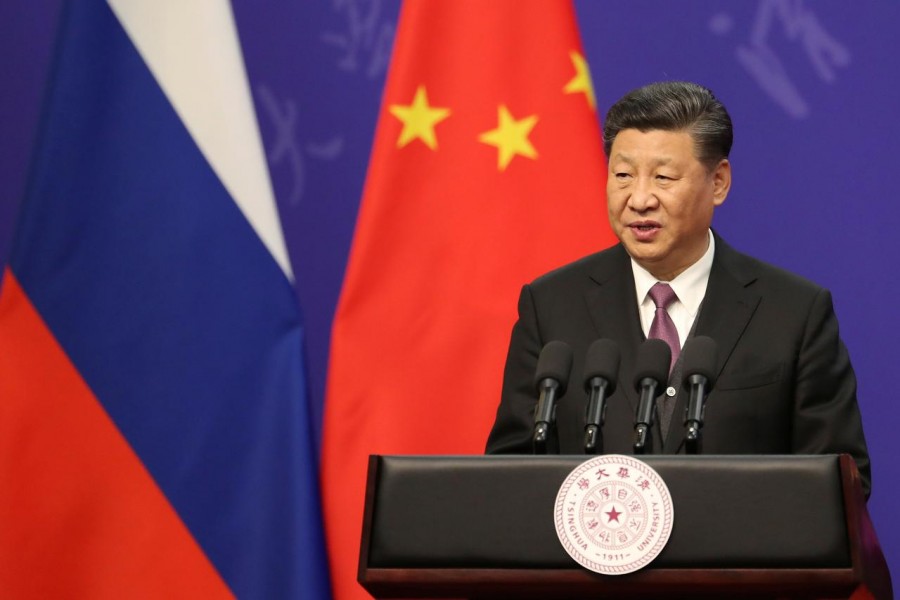BRI implementation
Xi pledges zero tolerance for graft
Second BR Forum concludes

Shahiduzzaman Khan, back from Beijing
Published :
Updated :

Beijing wore a festive look last week when as many as 37 world leaders gathered in the Chinese capital to attend the Second Belt and Road Forum for International Cooperation (BRF).
More than 5,000 participants from 150 countries were in Beijing for the three-day summit that ended on April 27.
The three-day Forum, which included 12 thematic forums, an opening ceremony and a leaders' roundtable, drew 5,000 participants from more than 150 countries and 90 international organisations.
The Belt and Road Initiative (BRI) is otherwise seen as Chinese President Xi Jinping's signature global infrastructure policy. First announced in 2013, the project promised to build ports, roads and railways to create new trade corridors linking China to Asia, Africa and Europe.
Since its launch, about 150 countries have signed the cooperation agreement. In the first half of 2019, overseas loans as part of the project amounted to more than $90 billion.
More concerning for Beijing was the absence of close partners, including Sri Lanka and Indonesia-leaders of both countries chose to stay away. India's absence was a much-talked about issue at the venue.
Sri Lanka signed a deal with a Chinese state-owned company on a 99-year lease in 2017 to transfer the strategically important Hambantota port. The transfer of the port was to lift some billion-dollar debts Sri Lanka owed to Beijing, debts which helped fund Hambantota in the first place.
Meantime, in Washington, the Trump administration was highly critical of Beijing's lending practices, with US Vice President Mike Pence denouncing it as 'debt diplomacy'. He said China was imposing high levels of debt on nations in the Asia Pacific to 'acquire strategic assets or political influence over debtor nations.' China has, however, strongly denied the US allegations about its lending practices.
Some of the heads of state were visibly impressed in Beijing meeting by the commitment to green development and financial sustainability. They said the BRI is a "fantastic initiative" and a great contribution to world development. More importantly, the open partnerships under the initiative are in the process of being perfected and improved through new dimensions such as green development.
At a time when some Western countries are critical of China for its alleged geopolitical motivations, President Xi talked about the need for cooperation, green development, common prosperity, win-win results and multilateralism.
He pledged transparency and zero-tolerance of corruption for the BRI implementation, a commitment hailed by the international community as a further boost to cooperation.
In his speech at the opening ceremony of the Second BRF, Xi called for building an open, green and clean initiative.
Everything should be done in a transparent way, he said, adding that there should be a zero tolerance attitude against corruption.
China has pledged to support 5,000 people from the innovation sector in BRI countries in exchanges, training programmes and joint research in the next five years. It is expected also to invite 10,000 representatives of political parties, think tanks and non-governmental organisations from countries participating in the BRI to China.
Earlier, the first council meeting of the Belt and Road News Network (BRNN) was held before the second BRF. The BRNN has been designed to serve as a platform for information-sharing, exchange and co-operation, news distribution and copyright trading among media outlets across the BRI countries.
The BRNN has also launched an official website and a mobile news information aggregation and distribution platform to provide services such as content uploading and sharing for BRNN members.
The platform is expected to support media organisations to exchange page layout, channels and time frames between one another to assist BRNN members with everything from the development of new forms of business and new technologies to jointly coping with the challenge of media transformation.
Proposed by Chinese president Xi Jinping in May 2017 at the first BRF, and later initiated by People's Daily, the BRNN has drawn positive response from domestic and overseas media.
With the concerted efforts of the relevant parties over the past two years, the BRNN has so far received 182 members from 86 countries, with 40 mainstream media outlets becoming council members upon invitation.
The BRNN, aiming to promote media co-operation to further facilitate the joint construction of the BRI, is expected to help broaden international co-operation under the BRI and serve as a new platform for people-to-people and cultural exchange.
The forum aims to expand the initiative's 'circle of friends' as well as boost connectivity among BRI markets and people. For these reasons, it has received widespread attention from the international community. The establishment of the BRNN has obviously demonstrated China's steadfast determination to safeguard economic globalisation. It is designed to hold meetings regularly, formulate timely co-operation plans for the members, set targeted agenda to study any problems in the construction of the BRI, and eventually integrate the BRNN into a big picture of BRI construction.
szkhanfe@gmail.com


 For all latest news, follow The Financial Express Google News channel.
For all latest news, follow The Financial Express Google News channel.